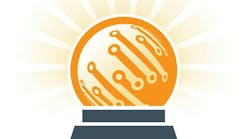Cognitive enterprises will define the future
Presenters don’t have to present from a stage. Keynotes can resemble conversations. And businesses can be—should be—increasingly considered “cognitive enterprises,” organizations that live and breathe, learn and adapt.
“Cognitive enterprises analyze and learn from the digital imprints humans and human institutions leave on society,” the chief innovation officer at consulting firm Cimphoni said. Cognitive enterprises transform themselves (their people and their processes) to boost efficiency. Cognitive enterprises adapt by learning from their own digital signatures.
The attentive audience took notes—cognitive businessmen and women looking to boost their own efficiency—as the speaker explored how businesses must alter their organizational structures to exploit opportunities of this digital era. This includes changing the approach to leadership, reimagining the roles of all employees (from the factory floor to the C-suite), and reevaluating the processes of how work gets done. These changes must be instituted and maintained in parallel, said Irwin, to be most effective.
Data is live
Informing these drastic changes is data. But not the data we’re used to. Data is no longer a recorded, static, lifeless entity, Irwin explained. Data is now live, like the people who collect and analyze it. Likewise, said the speaker, our reactions to this live data must also be lively. “Our analysis must match the speed at which data is being produced. And how do we accomplish this? We leverage the people, processes and technologies available.”
More so than other presenters at Smart Industry 2016, Irwin focused on the personnel interacting with new technologies, the individuals wielding these new digital tools. She noted that the millennial workforce is steering many of these changes, the increasingly prominent role of women in the world of technology, and the need to maintain humanities in education—putting the Arts into STEM to build STEAM—in order to produce fully functional professionals.
The sharing economy
Then, stepping back a bit, she shifted to the big picture—government, educational institutions and corporations recognizing the value of the cognitive enterprise. Encouraging, she noted, is the growing acceptance of the “sharing economy” promoted by millennials; those young professionals who have come of age in the era of Uber and file-sharing and are applying that mindset to the workplace.
“Why can’t you share your employees?” Irwin posited, more of a statement than a question.
The silo-ing of skills and information and people only hinders the cognitive enterprise, she noted, as it has done throughout the history of business. Irwin stressed the value of connecting disparate information systems and people in order to fully tap the potential new data streams and differently skilled personnel offer us. We’re going from digitized to connected to intelligent, she stressed. And the most aggressive on that path will reap the greatest benefits.
This is a good thing for young professionals in this field eager to jump in with their unique skill sets and a willingness to adapt. “Companies can’t wait around for personnel,” she summarized. “But they must be incented to continuously educate their teams.”
Of course, shifts as drastic as Irwin promotes bring with them new challenges. New skills are required. Other skills are becoming obsolete.
Growing complexity
While there will be less need for human involvement in many tasks, many tasks will grow increasingly complex, so much so that we cannot currently envision some of the demands of the cognitive enterprise in, say, 20 years. “How do you train children for the many jobs that don’t exist yet?” the keynote pondered.
With that hurdle in mind, the Irwin stressed that we must anticipate the future of industry and prepare workforces as best we’re able.
The smartest enterprises, she said, are the ones creating the future—dictating their own directions—reliant on new technologies, progressive mindsets and deeper analysis providing greater insights to guide business decisions.
“Defining the future is not accidental,” she said. “It is a combination of sensing, understanding and acting.”




